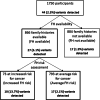Family history assessment significantly enhances delivery of precision medicine in the genomics era
- PMID: 33413596
- PMCID: PMC7791763
- DOI: 10.1186/s13073-020-00819-1
Family history assessment significantly enhances delivery of precision medicine in the genomics era
Erratum in
-
Correction to: Family history assessment significantly enhances delivery of precision medicine in the genomics era.Genome Med. 2021 Jul 5;13(1):109. doi: 10.1186/s13073-021-00916-9. Genome Med. 2021. PMID: 34225778 Free PMC article. No abstract available.
Abstract
Background: Family history has traditionally been an essential part of clinical care to assess health risks. However, declining sequencing costs have precipitated a shift towards genomics-first approaches in population screening programs rendering the value of family history unknown. We evaluated the utility of incorporating family history information for genomic sequencing selection.
Methods: To ascertain the relationship between family histories on such population-level initiatives, we analysed whole genome sequences of 1750 research participants with no known pre-existing conditions, of which half received comprehensive family history assessment of up to four generations, focusing on 95 cancer genes.
Results: Amongst the 1750 participants, 866 (49.5%) had high-quality standardised family history available. Within this group, 73 (8.4%) participants had an increased family history risk of cancer (increased FH risk cohort) and 1 in 7 participants (n = 10/73) carried a clinically actionable variant inferring a sixfold increase compared with 1 in 47 participants (n = 17/793) assessed at average family history cancer risk (average FH risk cohort) (p = 0.00001) and a sevenfold increase compared to 1 in 52 participants (n = 17/884) where family history was not available (FH not available cohort) (p = 0.00001). The enrichment was further pronounced (up to 18-fold) when assessing only the 25 cancer genes in the American College of Medical Genetics (ACMG) Secondary Findings (SF) genes. Furthermore, 63 (7.3%) participants had an increased family history cancer risk in the absence of an apparent clinically actionable variant.
Conclusions: These findings demonstrate that the collection and analysis of comprehensive family history and genomic data are complementary and in combination can prioritise individuals for genomic analysis. Thus, family history remains a critical component of health risk assessment, providing important actionable data when implementing genomics screening programs.
Trial registration: ClinicalTrials.gov NCT02791152 . Retrospectively registered on May 31, 2016.
Keywords: Cancer; Clinically actionable variants; Family history; Population genomics screening.
Conflict of interest statement
The authors declare that they have no competing interests.
Figures
References
-
- Hart MR, Biesecker BB, Blout CL, Christensen KD, Amendola LM, Bergstrom KL, et al. Secondary findings from clinical genomic sequencing: prevalence, patient perspectives, family history assessment, and health-care costs from a multisite study. Genet Med. 2019;21(5):1100. doi: 10.1038/s41436-018-0308-x. - DOI - PMC - PubMed
Publication types
MeSH terms
Associated data
Grants and funding
LinkOut - more resources
Full Text Sources
Other Literature Sources
Medical
Miscellaneous


